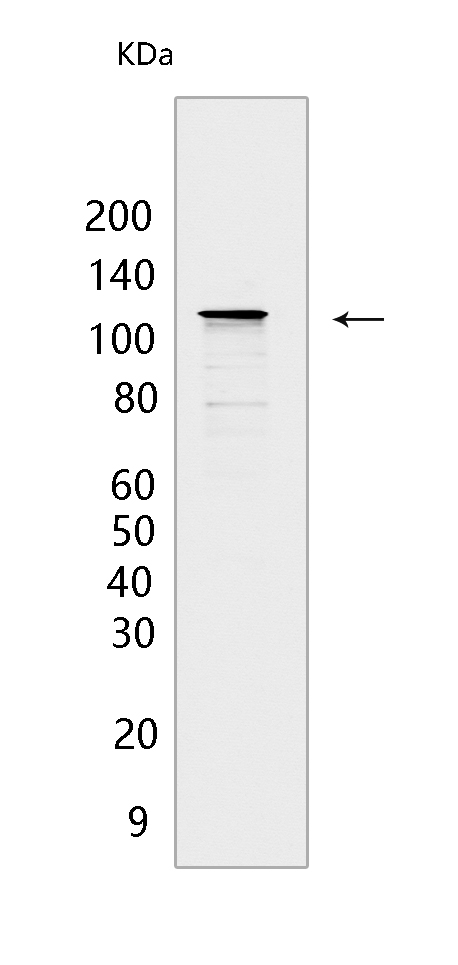PARG Mouse mAb[O39X]Cat NO.: A67167
Western blot(SDS PAGE) analysis of extracts from A549 cells.Using PARG Mouse mAb IgG [O39X] at dilution of 1:1000 incubated at 4℃ over night.
Product information
Protein names :PARG,PARG_HUMAN,Poly glycohydrolase
UniProtID :Q86W56
MASS(da) :111,110
MW(kDa) :111kDa
Form :Liquid
Purification :Protein A purification
Host :Mouse
Isotype :IgG
sensitivity :Endogenous
Reactivity :Human
- ApplicationDilution
- 免疫印迹(WB)1:1000-2000
- 免疫组化(IHC)1:100
- The optimal dilutions should be determined by the end user
Specificity :Antibody is produced by immunizing animals with a synthetic peptide of human PARG.
Storage :Antibody store in 10 mM PBS, 0.5mg/ml BSA, 50% glycerol. Shipped at 4°C. Store at-20°C or -80°C. Products are valid for one natural year of receipt.Avoid repeated freeze / thaw cycles.
WB Positive detected :A549 cells
Function : Poly(ADP-ribose) glycohydrolase that degrades poly(ADP-ribose) by hydrolyzing the ribose-ribose bonds present in poly(ADP-ribose) (PubMed:15450800, PubMed:21892188, PubMed:23102699, PubMed:23474714, PubMed:33186521, PubMed:34321462, PubMed:34019811). PARG acts both as an endo- and exoglycosidase, releasing poly(ADP-ribose) of different length as well as ADP-ribose monomers (PubMed:23102699, PubMed:23481255). It is however unable to cleave the ester bond between the terminal ADP-ribose and ADP-ribosylated residues, leaving proteins that are mono-ADP-ribosylated (PubMed:21892188, PubMed:23474714, PubMed:33186521). Poly(ADP-ribose) is synthesized after DNA damage is only present transiently and is rapidly degraded by PARG (PubMed:23102699, PubMed:34019811). Required to prevent detrimental accumulation of poly(ADP-ribose) upon prolonged replicative stress, while it is not required for recovery from transient replicative stress (PubMed:24906880). Responsible for the prevalence of mono-ADP-ribosylated proteins in cells, thanks to its ability to degrade poly(ADP-ribose) without cleaving the terminal protein-ribose bond (PubMed:33186521). Required for retinoid acid-dependent gene transactivation, probably by removing poly(ADP-ribose) from histone demethylase KDM4D, allowing chromatin derepression at RAR-dependent gene promoters (PubMed:23102699). Involved in the synthesis of ATP in the nucleus, together with PARP1, NMNAT1 and NUDT5 (PubMed:27257257). Nuclear ATP generation is required for extensive chromatin remodeling events that are energy-consuming (PubMed:27257257)..
Tissue specificity :Ubiquitously expressed..
Subcellular locationi :[Isoform 1]: Nucleus.
IMPORTANT: For western blots, incubate membrane with diluted primary antibody in 1% w/v BSA, 1X TBST at 4°C overnight.


